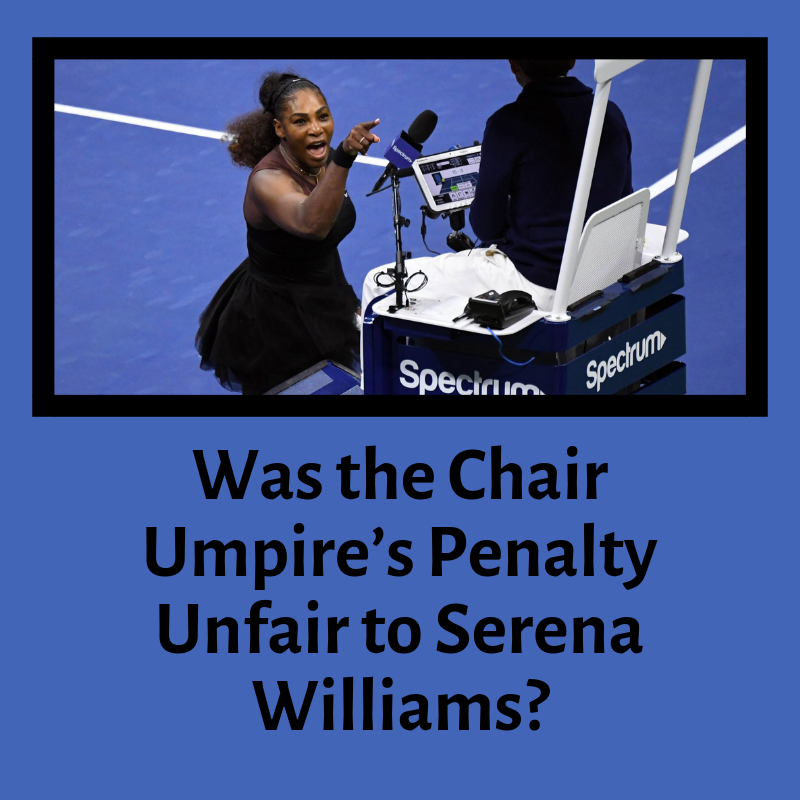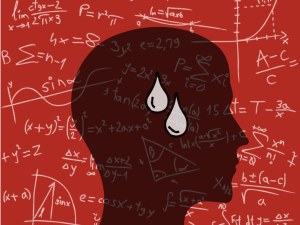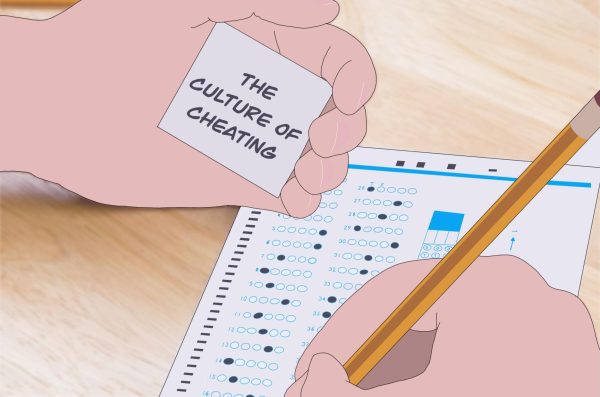Did Serena Williams Lose the Grand Slam Because of Sexist Penalties?
Last saturday marked the 2018 Grand Slam Singles Final, where Serena Williams lost against Naomi Osaka and received a penalty.
Sep 13, 2018
Saturday, Sep. 8, Serena Williams and Naomi Osaka faced off for the Grand Slam Final of the U.S. Open Singles Match. Osaka won in straight sets, 6-2 6-4, and gained her first Grand Slam singles win. During the game, Williams was given three warnings, one for receiving a signal from her coach in the stands to rush the net, another for verbally abusing the umpire and the third for smashing her racket on the ground. In professional tennis, when you receive one warning there are no deductions, when you receive 2 warnings you lose a point and on the third warning, a game is granted to the other player. In the second set, Williams was given a penalty for calling the umpire “a thief” for taking the point from her and at the end of the game, she received a total of $17,000 in fines. This has caused lots of controversy not only in the tennis community but worldwide. Her outbursts paled in comparison to the actions from some of the greatest male tennis players in the world, many of whom did not get penalized for what they did. The umpire’s calls were not fair to Williams, especially because of the standards that had been established by many men before her. Osaka’s win was largely a result of her hard work, but it is pivotal to note the umpire’s calls were unethical and unjust as she received penalties for issues that are often overlooked for male players.
“Although many coaches instruct their players during ATP or WTA matches without penalty, it is an official rule that players and coaches alike are aware of. Therefore, although an annoying call, Serena and her coach cannot argue the call, especially since her coach was obviously giving her motions to close in on the net. Subsequently, the second warning against her for smashing her racket and the third for insulting the umpire were well deserved. She claimed sexism played a role in the calls and that men do a lot worse during matches. Although men have done worse, they do not go past the first warning and therefore do receive point or game penalties. The first call would annoy any player but her subsequent reactions are what earned her the well deserved penalties,” junior Christopher Brazda said.
People disagree with each other on a daily basis, and in sports, these irritations are even more common. Everyone sees something different and interpret what is going on in their own way. That is why it is important to have an umpire to determine right from wrong without causing major chaos. They may not always agree with everyone, but they go by what they saw and make their call. Many tennis players do get upset if something is called that they do not agree with and they take out their frustrations on the umpire. Three-time Grand Slam champion Andy Murray lashed out in anger and kicked a tennis ball at the umpire’s face during the Cincinnati Masters final in 2016. He received no repercussions and went on to win the match. Another tennis player named Jimmy Connors repeatedly called the umpire “an abortion” and yelled many other derogatory terms at him throughout the sets, yet he did not receive a single penalty. Can you see the double standard? How Serena Williams, one of the best female players in the world, called the chair umpire “a thief” for taking her point and she got a penalty and $17,000 more in fines. What she did was indisputably disrespectful to the umpire, Carlos Ramos, who is known to be a stickler, but his rigidity was clearly magnified in the Grand Slam. She should be held accountable for her actions, but this double standard is evident. Enforcing the rule of “verbal abuse” is important, however it should be across the board, not only for a frustrated female player who made a mistake.
“I believe that Serena and the people that supported her were right in saying the umpire’s calls were sexist because there is proof of male tennis players overreacting and yelling at umpires or breaking tennis rackets and not receiving penalties, but the second a woman makes any commentary about how unjust the calls were, she is accused of verbal harassment and fined $17,000. If Serena Williams was a man, I don’t think that she would have received the penalty and fines,” freshman Hannah Fabing-Gonzalez said.
Williams is not alone in her fight, with many other organizations and people standing behind her actions. The Women’s Tennis Association (WTA) released a statement saying that “The WTA believes that there should be no difference in the standards of tolerance provided to the emotions expressed by men versus women and is committed to working with the sport to ensure that all players are treated the same. We do not believe that this was done last night.” The umpire’s calls impacted the result of the match and drew attention to these issues in the tennis world. Even the women’s tennis legend Billie Jean King agrees, saying “He involved himself in the end result. An umpire’s job is to keep control of the match, and he let it get out of control. The rules are what they are, but the umpire has discretion, and Ramos chose to give Williams very little latitude in a match where the stakes were highest.” It was not a fair penalty for Williams because of the precedents that were set, and that match was very important to her career. However, Williams showed good sportsmanship and appeared to be happy for Osaka.
This year’s Grand Slam Final was one to remember, not only because of Osaka’s powerful win, but also for the penalties that called forth attention to the double standards in tennis. Williams did not respond accordingly, but she also did not deserve to be the only one penalized for “verbal abuse” when many other players spoke the same way or even worse than her in the same situation. The umpires should make a decision to either be strict with all players on this rule, or with none at all. Targeting people for something they did because of their gender is never okay, and it is no different in tennis.






















